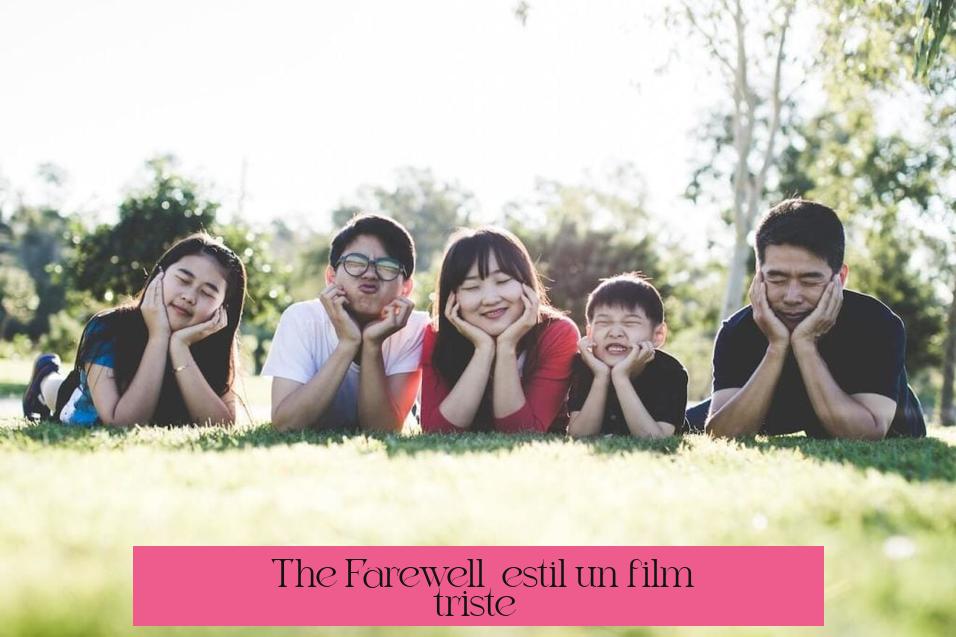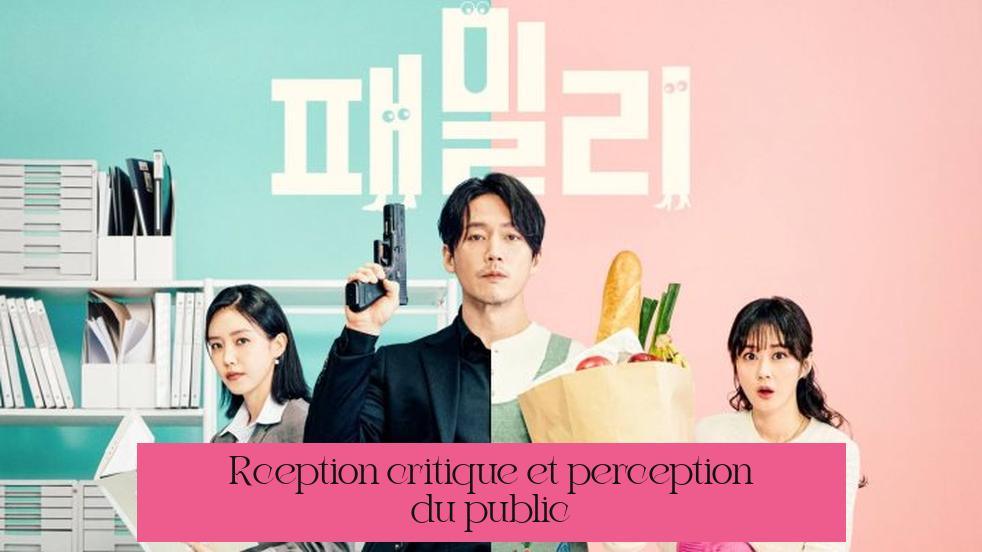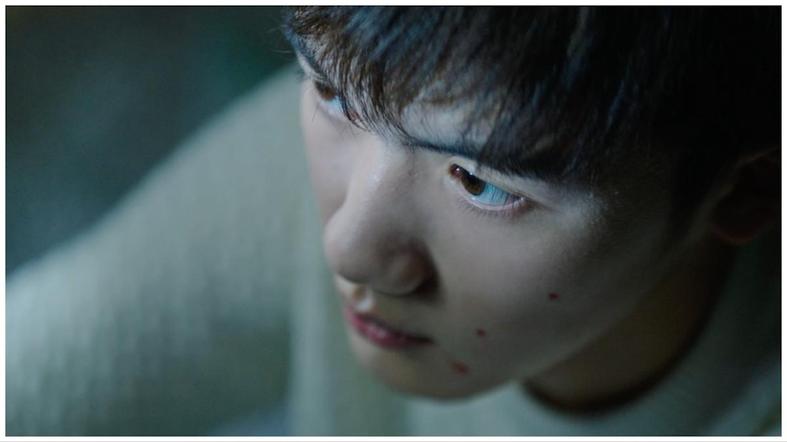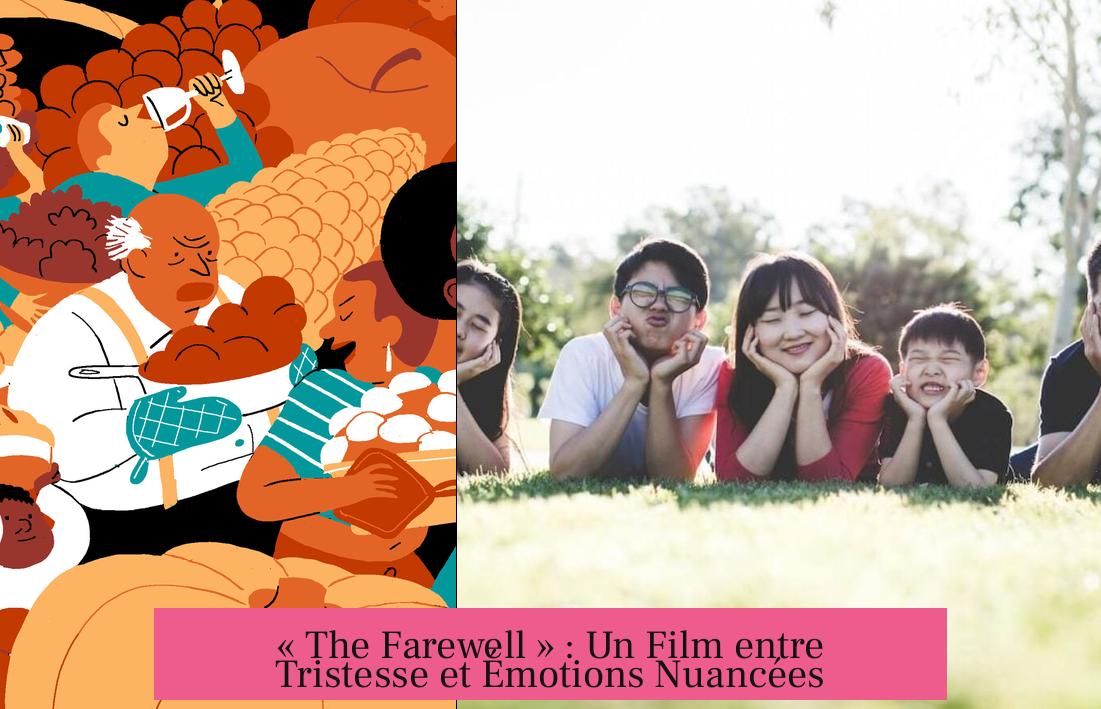« The Farewell » est-il un film triste ?

« The Farewell » est un film à la tonalité équilibrée entre tristesse et légèreté, offrant une expérience émotive nuancée plutôt qu’une simple œuvre triste. Ce long-métrage mêle humour, réflexion et gravité, proposant un regard authentique sur la perte et l’acceptation.
Une tonalité équilibrée entre drame et comédie
Le film raconte une histoire vraie traitée avec délicatesse. Il ne se veut pas mélodramatique ni larmoyant. Au contraire, « The Farewell » trouve un juste milieu entre moments joyeux et scènes empreintes de mélancolie.
- La réalisatrice Lulu Wang combine drame et comédie, créant un « dramedy » de qualité.
- Le film dépeint la mort avec légèreté tout en respectant sa gravité.
- Le résultat est une œuvre drôle, sérieuse et accessible émotionnellement.
Les thèmes traités : deuil, famille et mensonge bienveillant
La trame repose sur une famille chinoise qui cache un cancer terminal à sa grand-mère pour la protéger.
- Ce mensonge crée un dilemme moral central.
- La culture chinoise privilégie le collectif, évitant la vérité pour éviter la peur.
- Cette approche contraste avec les normes occidentales, qui valorisent la transparence.
- Le film interroge comment dire adieu sans réellement le dire.
Impact émotionnel nuancé

La dimension émotionnelle est multiple. Le spectateur ressent tristesse et joie, souvent simultanément.
- La grand-mère, Nai Nai, reste vive et drôle malgré la maladie.
- Les scènes mêlent humour décalé et moments tendres touchants.
- La performance d’Awkwafina, incarnant Billi, exprime subtilement l’émotion.
- La perte imminente fait surgir une profonde mélancolie sans tomber dans l’excès.
Les personnages et la narration
Le récit suit Billi, une jeune femme sino-américaine, confrontée aux différences culturelles et à la maladie familiale.
- Billi lutte entre valeurs occidentales d’individualisme et traditions chinoises collectivistes.
- La famille organise un faux mariage pour réunir ses membres.
- Chaque personnage exprime le deuil à sa manière.
- Cette dynamique renforce la richesse des émotions ressenties.
Contexte culturel essentiel
L’élément déclencheur est culturel : protéger Nai Nai en lui cachant la vérité fait partie de la tradition chinoise.
- Le film illustre ce conflit entre éthique occidentale et orientale.
- Le mensonge perçu comme un acte d’amour soulève une réflexion morale.
- L’histoire expose subtilement ces nuances sans porter de jugement.
Réception critique et perception du public

« The Farewell » a reçu un accueil très positif. Les critiques saluent son authenticité et sa capacité à toucher un large public.
- Les commentaires soulignent son mélange unique de gravité et de légèreté.
- Awkwafina est reconnue pour sa prestation profonde et nuancée.
- Le film invite à la réflexion sur la famille, la mort et le mensonge.
Perspective de la réalisatrice
Lulu Wang s’est inspirée de sa propre expérience familiale. Elle présente un récit sincère, révélant ses pensées avec clarté.
- Elle évite les clichés et propose une vision sans jugement.
- La réalisation est intime, immergeant le spectateur dans la vie familiale.
- Le film conjugue émotion et humour, reflétant la complexité du vécu.
Expérience vécue par le spectateur
Le public traverse une palette émotionnelle riche et variée. Le film provoque autant le rire que les larmes.
- Les scènes montrent que tristesse et joie coexistent souvent.
- Le récit invite à un questionnement personnel sur le deuil, la vérité et la famille.
- « The Farewell » n’est pas un film triste au sens classique, mais poignante et lumineuse.
Points essentiels à retenir

- « The Farewell » mêle habilement tristesse et humour dans une histoire émouvante.
- Le film explore le deuil et la famille selon une perspective sino-américaine.
- La pratique culturelle de dissimulation de la maladie crée une tension centrale.
- Les personnages affichent des émotions complexes et nuancées.
- La réception critique est très favorable envers la sincérité du récit.
- Les spectateurs vivent un voyage émotionnel riche, oscillant entre rire et larmes.
Is The Farewell a Sad Movie? An Honest and Nuanced Exploration
Is The Farewell a sad movie? The simple answer is: yes and no. It’s a film that blends sorrow with humor, grief with acceptance, and cultural clashes with heartfelt unity. It’s a dramedy, a delicate balance of comedy and drama that invites you to laugh, cry, and reflect—all in a single sitting.
Let’s unpack why The Farewell defies the usual label of ‘sad movie’ and why it remains a strikingly authentic, emotionally rich experience.
More Than Just Sadness: The Overall Tone and Genre
Lulu Wang’s The Farewell is neither a melodramatic tearjerker nor a light rom-com. It’s a masterclass in tonal balance. Wang crafts a story about death, yet the film carries a surprising lightness. It never becomes overly sentimental or mawkish, which makes it all the more genuine.
Think of it as a bittersweet concoction, where laughter and tears share the screen equally. For example, Awkwafina delivers what many consider her best role, perfectly capturing the complex emotions of Billi, the protagonist who is both humorous and heartbreakingly human.

The film’s dramedy style was praised widely at festivals and in reviews, commended for its ability to capture grief without overwhelming sadness. So, if you’re expecting just a sob story, you’ll find much more here.
The Heart of the Story: Themes of Grief, Family, and Culture
At its core, The Farewell tells the story of a family grappling with death—but with a twist: they don’t tell the grandmother, Nai Nai, about her terminal lung cancer diagnosis. This lie is not just a plot device; it’s an actual tradition in many Chinese families.
The ethical dilemma this generates is central to the film’s emotional impact—is protecting someone from pain kinder than telling the truth? The movie shows that in China, keeping such news secret is seen as an act of love, part of the collectivist value system. In contrast, Western cultures often prioritize individual knowledge and autonomy, so the clash feels real and unavoidable.
Billi, who straddles both East and West, embodies this conflict perfectly. She navigates American ideals of honesty and Chinese family loyalty, making the story universal yet deeply personal.
How Does the Film Feel? The Emotional Impact You’ll Experience

The Farewell moves fluidly between sadness and joy—much like Nai Nai herself, who remains lively and sharp-witted despite her illness. The warmth and humor Nai Nai radiates provoke both wide smiles and quiet tears, showing that grief isn’t a one-note experience.
The film also explores how different family members process impending loss. Billi keeps it together most consistently, while others express sadness in more fragmented ways. This nuanced portrayal steers clear of clichés: grief blossoms in many forms.
Awkwafina’s performance deserves special mention. She brings a layered intensity, combining comedic charm with emotional vulnerability. Her portrayal transcends culture and dares you to hold back tears when emotions hit.
One remarkable feature of the film is how it mines humor from melancholy moments, leaving viewers disarmed. You laugh, you cry, but it never feels forced or manipulative—a rare feat.
A Strong Ensemble: Characters Who Live Inside You
The story opens with the sentence “based on an actual lie,” setting the tone. Billi, played by Awkwafina, lives a New York City life full of hustle and uncertainty but cherishes her connection to Nai Nai in China.
When the family rushes to plan a wedding as an excuse to reunite, Billi’s parents forbid her from joining, fearing she’ll spill the secret. She defies them, caught between rebellion and respect. The tension adds layers to the narrative.
Nai Nai, portrayed by Shuzhen Zhao, is the heart of the film. She’s no fragile patient—she exercises regularly, runs the wedding banquet with gusto, and commands love without pretense. Her energy both comforts and unsettles.
The family members aren’t caricatures; they’re complicated humans with conflicting emotions. Through them, the film captures a spectrum of responses to illness and impending loss.
The Cultural Context Deepens the Complexity
A big part of The Farewell’s power lies in its cultural commentary. In many Chinese families, telling elders the truth about a terminal illness is seen as selfish. The responsibility to bear such news lies with the family collective; the individual’s emotional burden is avoided.
For Western viewers, this concept may seem alien or even unethical. The film doesn’t resolve this but highlights the clash. It invites reflection on the values of individualism versus collectivism.
For instance, Billi’s American parents feel compelled to value honesty, while her Chinese relatives protect Nai Nai by omission. This struggle enriches the story beyond a simple family drama, illustrating broader cultural patterns.
Critics and Viewers Alike Applaud Its Authenticity
The Farewell garnered wide acclaim from critics who praised Wang’s writing and directing talents. Reviewers called it one of the best dramedies of 2019 and described it as “deeply relatable with humor and honesty.”
Awkwafina’s role was often singled out as career-defining, breaking stereotypes about Asian-American women in film by delivering an authentic, layered performance.
The film was also recognized for honoring women’s central role in family dynamics, a tribute both loving and rare. Many viewers have reported seeing their own family struggles reflected, which speaks to the film’s universal reach despite its specific story.
Director Lulu Wang’s Personal Touch
Wang’s inspiration comes from her own family’s experience, lending the film profound sincerity. She approaches the story with candid transparency and affection.
Not only did Wang write and direct the film, but she also contributed to the soundtrack by playing piano—a deeply intimate touch that enhances the film’s atmosphere.
Her intimate, no-nonsense style keeps you invested without resorting to gimmicks. The family’s everyday routines, disputes, and hilarities feel vivid, immediate, truly lived.
Your Viewing Experience: Expect a Spectrum of Emotions
Watching The Farewell is more than just sitting through a sad movie. It’s an emotional journey marked by laughter, warmth, heartbreak, and hope. The film encourages you to ponder your own family relationships and question how you would say goodbye.
It evokes tears and catharsis, though never in a manipulative way. Instead, it balances the heaviness of mortality with lightness and charm, making it a film that’s uplifting even in its somber moments.
The Farewell doesn’t offer neat answers, but it invites honest reflection about love, loss, and belonging. It’s a movie that stays with you—not only for its sadness but for its celebration of life.
Final Thoughts: How Should You Approach This Movie?
If you want to know if The Farewell is a sad movie, here’s a nuanced perspective: it’s a film that confronts sadness head-on but refuses to be dominated by it.
You’ll find moments of humor that catch you off guard, cultural insights that challenge your assumptions, and performances that reveal raw human truth. It’s a film about saying goodbye without ever really saying it—about love wrapped in delicate lies.
So bring some tissues, but also bring your smile. The Farewell leaves you both sad and uplifted, confused and comforted. And maybe a bit richer for having experienced it.
Ready for a movie that makes you think while tugging at your heartstrings? Give The Farewell a watch—and see how it balances the fragile dance between grief and joy, East and West, truth and love.
Le film The Farewell est-il triste ?
Le film mélange tristesse et joie. Il parle de la perte sans sombrer dans le mélodrame. L’émotion est présente, mais toujours nuancée et légère.
Pourquoi The Farewell n’est-il pas simplement une histoire triste ?
La réalisatrice trouve un équilibre entre le chagrin et l’humour. L’histoire est touchante et pleine de moments chaleureux malgré la gravité du sujet.
Comment le film aborde-t-il le thème de la mort ?
Le film traite la mort à travers le prisme d’une famille qui décide de cacher la vérité à leur grand-mère malade. Cela soulève un dilemme moral et culturel.
Le personnage de Nai Nai est-il source de tristesse ?
Nai Nai est vivante et pleine d’énergie. Son caractère apporte à la fois sourire et émotion, ce qui rend l’histoire plus complexe qu’une simple histoire triste.
Le film fait-il réfléchir sur les différences culturelles liées à la maladie ?
Oui, il oppose la vision chinoise, où l’on protège les malades par le silence, à la vision occidentale, qui prône la vérité. Ce contraste enrichit la dimension émotionnelle.
Peut-on pleurer en regardant The Farewell ?
Oui, le film provoque souvent les larmes. Mais celles-ci viennent d’un mélange d’émotions sincères, pas d’un excès dramatique.

